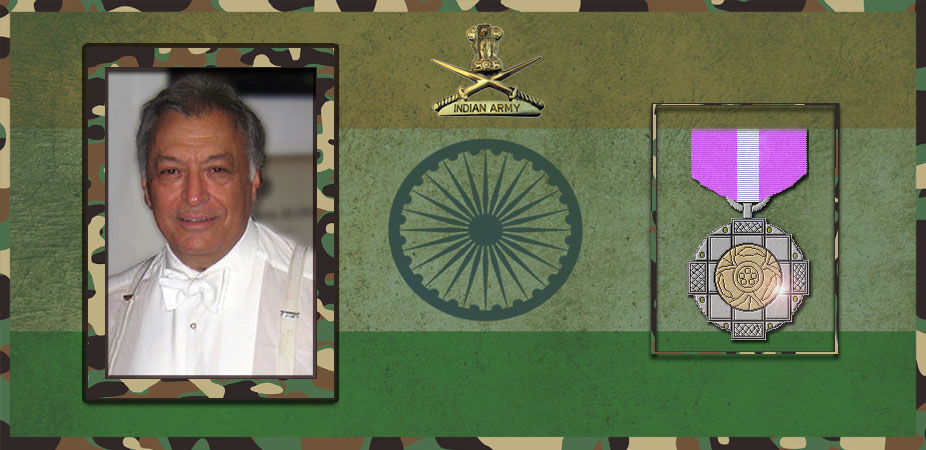Let's salute to our Indian Army together, We are proud to be Indian.
Let's salute to our Indian Army together, We are proud to be Indian.

Zubin Mehta (born 29 April 1936) is an Indian conductor of Western classical music. He is currently music director of the Israel Philharmonic Orchestra (IPO).
Mehta’s father was the founder of the Bombay Symphony Orchestra, and from him, he received his early musical education. When he was 18 he enrolled in the Vienna state music academy where he graduated after three years with a diploma as a conductor. He began winning international competitions and conducted the Royal Liverpool Philharmonic at age 21. Beginning in the 1960s Mehta gained experience by substituting for celebrated maestros throughout the world.
Mehta was Music Director of the Montreal Symphony Orchestra from 1961 to 1967, and Music Director of the Los Angeles Philharmonic Orchestra from 1962 to 1978, being the youngest music director ever for any major North American orchestra. In 1969, he was appointed Music Adviser to the Israel Philharmonic Orchestra and in 1981 Mehta became its permanent Music Director for Life. From 1978 to 1991, he was Music Director of the New York Philharmonic. Since 1985, he has also been chief conductor of the Maggio Musicale Fiorentino in Florence, Italy.
He is an honorary citizen of both Florence and Tel Aviv and was made an honorary member of the Vienna State Opera in 1997 and of the Bavarian State Opera in 2006. The title of “Honorary Conductor” was bestowed to him by numerous orchestras throughout the world. More recently, Mehta made several tours with the Bavarian State Opera and kept up a busy schedule of guest conducting appearances until present times. In December 2006 he received the “Kennedy Center Honor” and in October 2008 was honored by the Japanese Imperial Family with the “Praemium Imperiale”. In 2016, Zubin Mehta has been appointed as Honorary Conductor of the Teatro San Carlo, Naples.
Mehta was born into a Parsi family in Bombay (now Mumbai), India, the older son of Mehli (1908–2002) and Tehmina (Daruvala) Mehta. His family was Parsi, descendants of Zoroastrian Persians who fled their country under religious persecution in the eighth century and settled in Bombay. His father was a self-taught violinist and who founded and conducted the Bombay Symphony Orchestra and later the American Youth Symphony, which he conducted for 33 years after moving to Los Angeles. His father had previously lived in New York in order to study under violinist Ivan Galamian, a noted teacher who also taught Itzhak Perlman and Pinchas Zukerman. His father returned to Bombay as a finished violinist of the Russian school. Mehta notes that on many occasions when he conducts throughout the U.S., someone approaches him to say, “You don’t know how much I loved your father!”.
Mehta at age seven was first taught to play violin and piano by his father. When he reached his early teens his father allowed him to lead sectional rehearsals of the Bombay Symphony, and at sixteen he was conducting the full orchestra during rehearsals.
Mehta graduated secondary school from St. Mary’s School, Mumbai and went on to study medicine at St. Xavier’s College, Mumbai, at the urging of his mother, who wanted him to take up a more “respectable” profession than music. At age eighteen, he dropped out after two years to move to Vienna, one of Europe’s music centers, in order to study music under Hans Swarowsky at the state music academy. He lived on $75 per month, and with him at the academy were conductor Claudio Abbado and future conductor-pianist Daniel Barenboim.
He remained at the academy for three years, during which time he also studied the double bass, which he played in the Vienna Chamber Orchestra. Swarowsky recognized Mehta’s abilities early on, describing him as a “demoniac conductor” who “had it all.” While still a student, after the Hungarian Revolution of 1956, he organized a student orchestra in seven days and conducted it in a concert at a refugee camp outside Vienna.
He graduated in 1957 when he was twenty-one with a diploma in conducting. In 1958 he entered the Liverpool International Conductor’s Competition with a hundred contestants and took first prize. The prize included a year’s contract as associate conductor of the Royal Liverpool Philharmonic, which he conducted in fourteen concerts, all of which received rave reviews.
He then was a 2nd place prize-winner at the summer academy at the Tanglewood Music Center in Massachusetts. At that competition he attracted the notice of Charles Munch, then the conductor of the Boston Symphony, who would later help his career. In 1958, he boldly programmed an all-Schoenberg concert, which did so well that he accepted further bookings. That same year he also married a Canadian voice student, Carmen Lasky, whom he met in Vienna.
Honours and awards